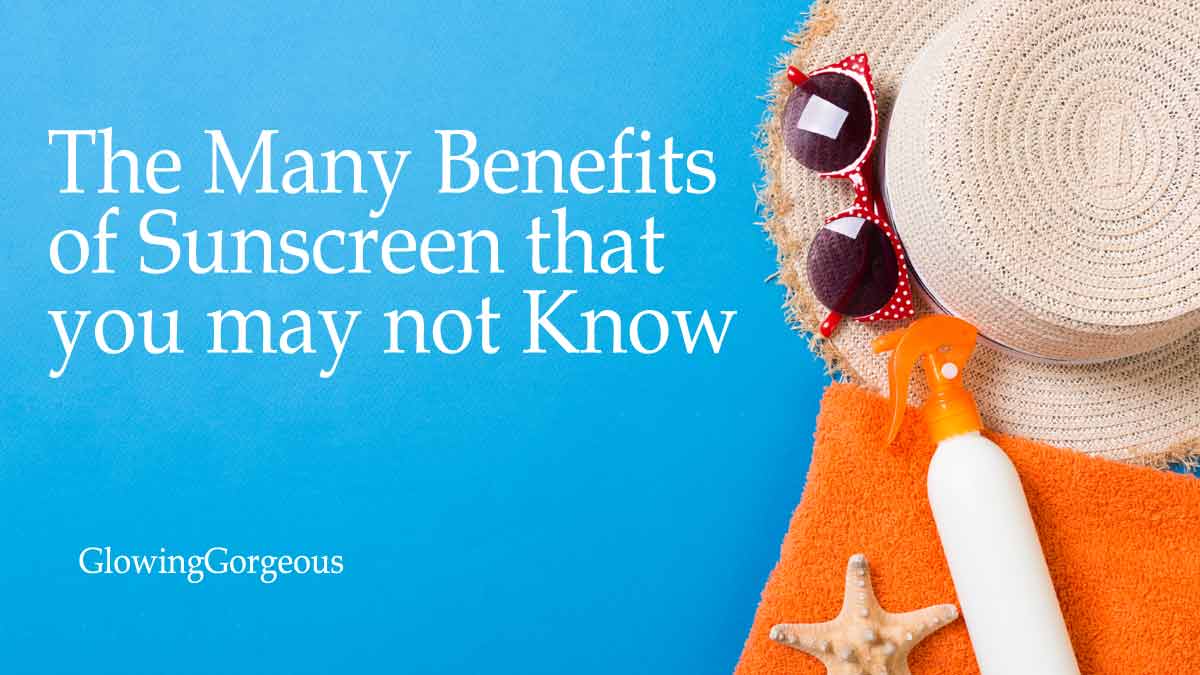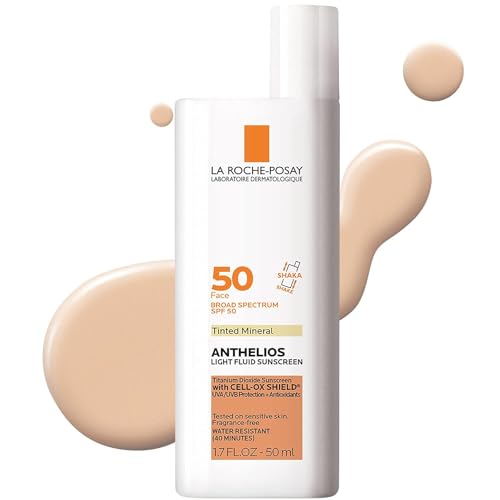We all know that feeling of stepping outside on a sunny day—the warmth, the brightness, and the instant mood lift. But let’s not forget that with great sunlight comes great responsibility. I’m talking about sunscreen, your skin’s loyal sidekick in the never-ending battle against the sun’s harmful UV rays.
It’s not just a summer fling; sunscreen is a commitment, one that should be part of your daily skincare routine. Why, you ask? Well, aside from preventing the lobster look (aka sunburn), it’s your front-line defense in reducing the risk of skin cancer and keeping your skin looking as youthful as a Hollywood newcomer. But wait, have you considered how sunscreen benefits more than just your skin’s health?
More from Glowing Gorgeous: Find out here the Best Silicone-Free Moisturizers And Why Do You Care
Highlights
- Using sunscreen daily significantly reduces the risk of skin cancer and premature aging.
- Other benefits include preventing sunburn and shielding us from harmful UV rays
- Choosing the right sunscreen involves considering SPF level, spectrum coverage, and skin type compatibility.
- Proper application and reapplication are key to ensuring effective sun protection.
The 13 Benefits of Sunscreen
Let’s not beat around the bush; sunscreen is a superstar in the skincare universe, and I’ve spent a good chunk of time researching the why. So, here’s a comprehensive rundown of the 13 benefits that make sunscreen an absolute must in your daily routine.
- Helps prevent skin cancer: Sunscreen is your best friend in the fight against harmful UV rays, playing a vital role in decreasing the chance of developing skin cancers like melanoma. It works by creating a protective layer that keeps those dangerous rays from harming your skin’s DNA, acting as a shield against serious health threats.
- Keeps you looking young: By routinely applying sunscreen, you’re not just protecting your skin; you’re also keeping it looking young and fresh. Sunscreen helps to avoid the breakdown of collagen, which means fewer wrinkles and less sagging skin, letting you maintain a youthful glow.
- Boosts skin health: Sunscreen is crucial for keeping your skin healthy, defending it from inflammation and damage caused by the sun. This keeps your skin strong and hydrated, making it look and feel healthier. It keeps essential skin proteins like collagen, keratin, and elastin in tip-top shape. These proteins are crucial for keeping your skin smooth and healthy.
- Protects from sunburn: Sporting sunscreen is like putting on invisible armor against the sun’s rays that cause sunburn. Whether you’re playing outside or just taking a walk, sunscreen keeps your skin safe and sound, free from the redness and pain of a burn.
- Defends against all UV rays: With sunscreen, you get a top-notch defense against the whole range of harmful UV rays. This means you’re safeguarded from the different types of damage the sun can do, keeping your skin protected no matter what.
- Ensures lasting sun protection: Sunscreen is your go-to for all-day defense against the sun. It creates a barrier that minimizes damage and lets you have fun outdoors without worrying about your skin.
- Minimizes inflammation: If your skin gets easily irritated by the sun, sunscreen can calm it down and reduce redness. Its ingredients are like a soothing balm, helping your skin recover quicker from any irritation.
- Helps avoid melasma: For those concerned about dark patches on their skin, sunscreen can be a game-changer. It prevents these spots from getting darker by shielding your skin from the sun’s rays that trigger pigment production.
- Keeps your skin tone even: Sunscreen is great for avoiding unwanted dark spots and keeping your complexion even and balanced. It works by controlling melanin production, ensuring your skin stays smooth and even-toned.
- Reduces signs of aging: By preserving the vital proteins in your skin, sunscreen plays a key role in keeping your skin firm and wrinkle-free. This means you get to enjoy a more youthful appearance for longer.
- Prevents premature aging: Regularly using sunscreen is your secret weapon against the early signs of aging. It blocks both types of harmful rays, keeping your skin safe from sunburn and deeper damage, and preserving its youthful look.
- Great cosmetics option: Sunscreen isn’t just for protection; it’s also a fantastic cosmetic choice. It can serve as a primer, often giving your skin a lovely matte finish, making it a stellar base for makeup. It also provides the defense your skin needs against photoaging, reducing the need for makeup to cover up sun damage and letting your natural beauty shine through.
- Shields your DNA: By blocking UV radiation, sunscreen protects your skin’s DNA from damage that could lead to cancer. This protective barrier is essential for maintaining healthy skin and reducing the risk of skin cancer.
Here’s a fact that should make you sit up straight: According to the Skin Cancer Foundation, applying sunscreen with an SPF of at least 15 decreases the risk of developing squamous cell carcinoma by 40% and melanoma by 50%. Those are numbers you can’t ignore.
So, I urge you, make sunscreen a non-negotiable part of your daily skincare ritual. It doesn’t matter if it’s raining, if you’re just popping out to the store, or if you’re glued to your laptop all day—sunscreen is your skin’s best friend, every day, in every way.
The Science Behind Sunscreen
We often slather on sunscreen without a second thought, but the science behind this protective potion is fascinating. Sunscreens come packed with either chemical or physical ingredients, each with a distinct role in shielding our skin from the sun’s rays. Chemical sunscreens are like your skin’s personal bodyguards, absorbing UV light through a complex chemical reaction and converting it into harmless heat. These sunscreens typically contain ingredients such as avobenzone or oxybenzone, which are adept at absorbing a wide range of the UV spectrum.
On the other side of the coin, we have physical sunscreens, the stoic bouncers of the UV world. They contain active mineral ingredients, like zinc oxide or titanium dioxide, that sit on the surface of the skin and reflect UV rays away. It’s a bit like wearing a mirror on your skin, but thankfully more comfortable and socially acceptable. These physical blockers are particularly good news for those with sensitive or acne-prone skin, as they’re less likely to cause irritation.
But wait, there’s more! When we talk about UV rays, we’re dealing with two main culprits: UVA and UVB. UVA rays are the aging artists, penetrating deep into the skin and contributing to wrinkles and sunspots, while UVB rays are the burn bandits, causing sunburns and playing a significant role in skin cancer. This is where broad-spectrum sunscreens come into play, offering comprehensive coverage against both types of UV rays. It’s like wearing a full suit of armor instead of just a helmet.
Mineral-based sunscreens have gained popularity for their broad protection spectrum. Zinc oxide and titanium dioxide are the go-to ingredients for those seeking a sunscreen that sits on top of the skin rather than being absorbed into it. These minerals provide a physical barrier against UV rays, making them a superior choice for protecting against both UVA and UVB rays. Plus, they’re less likely to cause skin reactions, which is a sigh of relief for those with delicate skin.
Speaking of mineral-based sunscreens, let’s talk about a product that really shines in this category: EltaMD UV Clear Broad-Spectrum SPF 46.
EltaMD UV Clear is a standout because it’s specifically formulated for sensitive and acne-prone skin. It’s lightweight, oil-free, and contains zinc oxide for that physical protection against the sun. Plus, it includes niacinamide, hyaluronic acid, and lactic acid, which are ingredients that promote healthy-looking skin. It’s a fantastic pick for those who need broad-spectrum protection without the fear of flare-ups.
In summary, whether you choose a chemical or physical sunscreen, the key is to look for broad-spectrum protection to keep both UVA and UVB rays at bay. And for those with sensitive skin, mineral-based options like EltaMD UV Clear are definitely worth considering for their gentle yet effective protection.
Mastering Your Shield
When it comes to safeguarding your skin from the sun’s rays, think of sunscreen as your personal knight in shining armor. But not all knights are created equal, so it’s critical to choose wisely. I recommend reaching for sunscreens with an SPF of 30 or higher. Why? Because they block out about 97% of UVB rays, and we’re all about maximizing protection. Plus, broad-spectrum coverage is your best bet—it’s like a security blanket against both UVA and UVB rays.
More from Glowing Gorgeous: Find out here Hyram’s Recommended Face Sunscreens For The Summer
For those of us with sensitive skin, mineral-based sunscreens are the gentle giants in the world of sun protection. They sit on top of your skin creating a barrier against the sun, rather than soaking in, which means they’re less likely to cause irritation. And if you’re like me and your skin throws a fit now and then, look for ingredients like niacinamide, which is a boon for acne-prone skin types.
Now, let’s tackle a big misconception: the idea that if your skin is like a perpetual tan, you don’t need sunscreen. That’s a no-go. Everyone, regardless of skin tone, needs sunscreen to protect against damage and the risk of skin cancer.
Let’s not forget the water resistance factor. If you’re planning to take a dip or expect to sweat, water-resistant options are your ally, keeping you covered even when wet.
Mastering Sunscreen Application
Now, onto the art of application. Think of it as prepping your skin for battle. You wouldn’t rush a knight into the fray without his armor, right? So, apply your sunscreen at least 30 minutes before stepping out. This gives it time to form that protective shield. And just like a knight might sharpen his sword, you’ll need to reapply your sunscreen every two hours to maintain peak defense, especially after swimming or breaking a sweat.
I can’t stress enough the importance of using enough sunscreen. Most people skimp on this, but you need a good dollop—the size of a shot glass—to cover all the exposed areas. And don’t forget those sneaky spots like your ears, the back of your neck, and the tops of your feet.
Concerns about ingredients in sunscreens seeping into our bloodstream have made waves recently. While ongoing safety evaluations are important, rest assured that the benefits of using sunscreen far outweigh the potential risks. The key is to stay informed and choose products with a track record of safety and efficacy.
Complementing Sunscreen: Additional Protective Measures
While sunscreen is a formidable ally in our quest to shield our skin from the sun, it’s not a solo act. Think of it as part of a dynamic duo—or even a whole squad—of sun protection strategies. For instance, when the sun is playing peek-a-boo with the clouds, don’t be fooled; seek shade whenever possible. It’s a simple, yet effective tactic to minimize your exposure to those sneaky UV rays.
But let’s not stop there. Dressing the part is key. Slip into some protective clothing—long sleeves and pants made from tightly woven fabric are your undercover agents against the sun. And don’t forget to top it off with a hat. Not just any hat, though. A wide-brimmed one that shades your face, ears, and the back of your neck is like having a personal bodyguard against the sun’s advances.
Your eyes need a shield too, and UV-blocking sunglasses are just the ticket. They’re like the cool secret service agents of your face, keeping a lookout for harmful rays that want to crash the party. Plus, they prevent squinting, which, let’s be honest, nobody wants those premature “experience lines” around their eyes.
Now, let’s talk about something that’s not as obvious: UV index. This little number tells you how strong the UV radiation is in your area at any given time. Keeping an eye on it is like having inside information—it helps you plan your outdoor activities when the sun isn’t at its peak power.
And for those of us who spend a lot of time in our cars, UV-protective window films are like having an invisible force field around your vehicle. They’re not just for those high-speed chases in action movies; they’re for everyday drives, protecting your skin from the sun’s relentless pursuit.
“The risk of sun damage on our skin from harmful UV rays is increasing every day due to the depletion of the ozone layer.” It’s a stark reminder that we need to up our game. Our skin’s health is at stake, and it’s not something we can afford to gamble with.
Combining sunscreen with these additional protective measures creates a comprehensive UV protection strategy. It’s like assembling a team of superheroes for your skin, each with their own special powers, working together to keep you safe from the sun’s harmful effects. And let’s face it, we could all use some superpowers in our lives.
Understanding Sunscreen Controversies
When it comes to sunscreen, it seems like the plot thickens with every new study that hits the headlines. I’ve spent a fair amount of time sifting through the latest research, and let me tell you, it’s a bit of a roller coaster. Some studies have raised the red flag on certain ingredients found in sunscreens, suggesting they might not be as friendly to our skin or the environment as we once thought.
For example, oxybenzone and octinoxate, common ingredients in chemical sunscreens, have been under scrutiny. Research has suggested that these ingredients can disrupt hormones and may not be as benign as a summer breeze. But before we all throw our sunscreen bottles out the window, it’s important to note that ongoing research is, well, ongoing. Scientists are working tirelessly to understand the full spectrum of effects these ingredients have, not just on us but on marine life too. After all, what we wash off our bodies often finds its way to the ocean, affecting coral reefs and aquatic creatures.
Another hot topic is the potential environmental impact of sunscreen ingredients. When we swim in the ocean, some of the sunscreen we wear can wash off and contribute to coral bleaching. This is a serious issue because coral reefs are like the metropolis of marine life; they’re incredibly important for the ecosystem. That’s why places like Hawaii have started banning sunscreens containing certain chemicals.
But let’s not toss the baby out with the water. Sunscreen remains a critical player in our defense against the sun’s harmful rays. The trick is to stay informed and choose products wisely. We should all adhere to proper usage guidelines, like applying a generous amount of sunscreen, reapplying it every two hours or after swimming or sweating, and using it in conjunction with other sun protection methods.
As we navigate through these controversies, it’s crucial to remember that protecting our skin from UV damage is still the main goal. The American Academy of Dermatology continues to recommend using sunscreen as part of a comprehensive sun protection strategy. So, while we wait for the science to give us clearer answers, let’s keep slathering on that SPF—just maybe opt for a formula that’s friendlier to both our skin and the environment.
The Bottom Line
We’ve talked a lot about sunscreen, haven’t we? And for good reason. Sunscreen is like that trusty friend who always has your back—or in this case, your skin. It’s the shield that helps keep your skin looking youthful and, more importantly, healthy. Sunburns can seem like just a temporary inconvenience, but they’re actually signs that your skin cells have been damaged by too much UV radiation. And let’s not forget, melanoma, the most serious form of skin cancer, is lurking around the corner as a potential consequence of repeated unprotected exposure to the sun’s rays.
So, what’s the takeaway here? Well, I can’t stress enough the importance of slathering on that sunscreen every single day. Yes, even when it’s cloudy. UV rays are sneaky; they can get you even when the sun isn’t shining bright. But sunscreen isn’t the only player in the game. We can also wear hats, seek shade, and rock those UV-blocking sunglasses to keep our skin in the clear.
Now, with all the buzz about certain sunscreen ingredients possibly being less than ideal for our health and the planet, it’s crucial to stay in the loop. The world of sunscreen is always evolving, and so should our choices. By choosing products wisely and using them correctly, we make sunscreen an essential ally in our daily health routine. It’s all about finding that balance between protecting ourselves and being kind to the environment. So, let’s keep our ears open for the latest research and our skin safely covered.


 EltaMD UV Clear Face Sunscreen, SPF 46 Oil Free Sunscreen with Zinc Oxide,...
EltaMD UV Clear Face Sunscreen, SPF 46 Oil Free Sunscreen with Zinc Oxide,...
 La Roche-Posay Anthelios Melt-In Milk Body & Face Sunscreen SPF 60, Oil Free...
La Roche-Posay Anthelios Melt-In Milk Body & Face Sunscreen SPF 60, Oil Free... La Roche-Posay Anthelios Tinted Sunscreen SPF 50, Ultra-Light Fluid Broad...
La Roche-Posay Anthelios Tinted Sunscreen SPF 50, Ultra-Light Fluid Broad... innisfree Daily UV Defense Sunscreen Broad Spectrum SPF 36 Face Lotion, 1.69 Fl...
innisfree Daily UV Defense Sunscreen Broad Spectrum SPF 36 Face Lotion, 1.69 Fl...
Comments